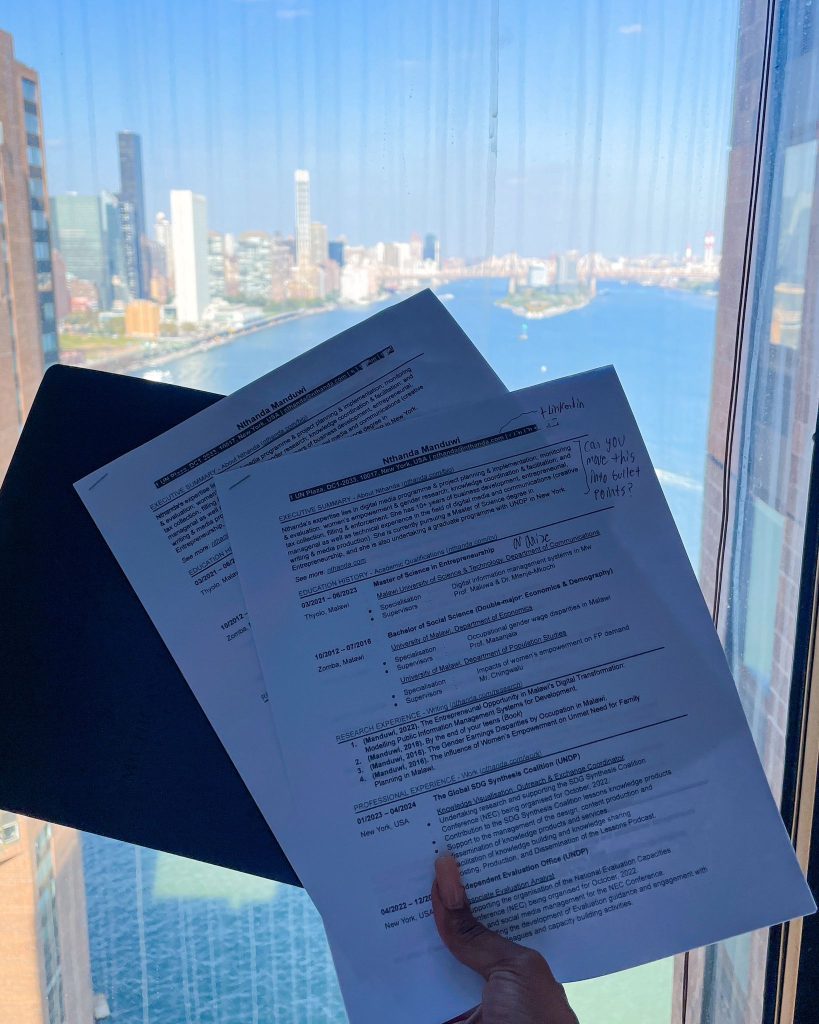


Some of the options to consider when thinking of postgraduate education are the opportunities to pursue a Masters Degree, an MBA (Master of Business Administration), or a PhD.
Applying for a postgraduate degree, whether it’s a master’s or 𝗮 doctoral programme, can be a complex and competitive process.
This post goes into detail – sharing insights from 40+ leading Universities (thanks to the MBA and Master’s Tours hosted by the Graduate Management Admission Council ™ (GMAC ™)) on things to consider when applying for a Masters, an MBA, or a PhD.
Personally, I am pivoting my career, and see myself wanting to gain some experience in the private sector. At the moment, professionally, I am a development professional: an international policy analyst, and an entrepreneur in different capacities. I work for an INGO, and I also run a non-profit that empowers young professionals – getting them on the path to their dream careers.
As someone who has built several startups and studied entrepreneurship at postgraduate level, the question for me remains ‘would an MBA/a PhD be of value to me?’
To ensure I am well-informed as I am making this decision, I attended not one, but two MBA Tours (February and July) as were hosted by GMAC (the Graduate Management Admissions Council) in NYC. I have also attended Diversity Preview/MBA Connection days with New York University, Michigan State University, and Rochester University.
I am sharing this with you, as I am doing my own research for postgraduate degree options. As it stands, I am completing my MSc. Entrepreneurship with the Malawi University of Science and Technology, and I am yet to determine if I am going to pursue an MBA or a PhD next. Truthfully? I will go where the highest scholarship comes from.
Below, a few things I have learnt, which you can consider when deciding on/applying for a postgraduate programme.
1. Research your options: Explore different programmes, universities, and fields of study to find the one that aligns with your academic and career goals. Consider factors like location, programme duration, faculty expertise, and available resources.
2. Application deadlines: Note the application deadlines for each programme you’re interested in, as they can vary significantly.
3. Entry requirements: Understand the specific admission requirements for each programme, including prerequisites, standardized tests (e.g., GRE, GMAT, TOEFL, IELTS), and minimum GPA.
4. Letters of recommendation: Identify potential recommenders who know you well academically or professionally. Ask for their recommendations well in advance, and provide them with relevant information about your goals and achievements.
5. Statement of purpose: Write a compelling and well-structured statement of purpose (SOP) that explains your motivations, goals, and how the programme aligns with your aspirations. Tailor each SOP to the specific programme.
6. Curriculum vitae (CV) or resume: Prepare a comprehensive CV or resume that highlights your academic, professional, and extracurricular achievements and experiences.
7. Academic transcripts: Request official transcripts from your undergraduate institution(s) and ensure they are sent to the universities you’re applying to. Please note various Universities will give clear instructions on when and how these transcripts are sent in.
8. Financial considerations: Research the cost of tuition and living expenses for each programme and explore scholarship, grant, or financial aid opportunities.
9. Interview or portfolio: Some programmes may require an interview or a portfolio of your work as part of the application process. Prepare accordingly.
10. English language proficiency: If you’re a non-native English speaker and the language of instruction in the Undergraduate University you attended was not English, take the necessary language proficiency tests and meet the minimum score requirements. Plan for additional language support if needed.
11. Standardized tests: Prepare thoroughly for any required standardized tests. Take practice exams and consider enrolling in test prep courses if necessary. I will share more on this soon.
12. Application fees: Be aware of application fees, and budget for these expenses. Some programmes offer fee waivers for eligible candidates.
13. Scholarships and financial aid: Explore scholarships and financial aid options both within the university and externally. Apply for as many as you are eligible for. Get in touch with previous recipients of the scholarship – acquintances and strangers alike (keeping it professional), and get insights on best practices.
14. Review application materials: Before submitting, carefully review your application materials for errors, and consider having someone else proofread them as well.
15. Follow-up and confirmations: After submitting your applications, monitor your email for updates and follow up with the universities to ensure they have received all your documents.
16. Interviews: Be prepared for interviews if they are part of the application process. Practice answering common interview questions and be ready to discuss your qualifications and goals.
17. Keep backup options: Apply to multiple programmes to increase your chances of acceptance, and have backup options in case you are not admitted to your first-choice programme.
18. Stay organized: Create a spreadsheet or document to track deadlines, requirements, and correspondence with each university. This will help you stay organized throughout the application process.
Applying for a postgraduate degree is a demanding process, but thorough preparation and attention to detail can increase your chances of admission to the programme of your choice. Be proactive and start early to give yourself the best chance of success.
All my love,

I have come to learn that though for different purposes, several tips apply for both academic and professional CVs. I have spent my year trying to learn as much as I can about professional development, both for personal but also entrepreneurial reasons. Personally, I am pivoting my career and see myself wanting to gain some experience in the private sector.
In this post, I share some tips for writing a compelling CV that is nearly guaranteed to get you hired/selected (if you have the required experience, and are a match for the role).
In the previous newsletter, I shared some tips for writing a compelling CV that is nearly guaranteed to get you hired (if you have the required experience).
In 2023, I 40+ Universities at the two 2023 MBA Tours which were held in New York City. I got to learn a lot about MBAs and the schools that offer them. Initially, I shared in detail re what I learnt at the MBA Tour – why I thought an MBA might not be for me, and potentially why it just might be for you! What the video about the MBA tour here.
Having decided that an MBA was not for me, I found myself still yet attending MBA events. I was invited to attend two diversity conferences with the University of Rochester and Michigan State University, and I think I had quite the change of heart, having gotten more information.
Having Obtaining a Master of Business Administration (MBA), specifically in North America, can offer significant value and benefits, both professionally and personally. The region, encompassing the United States and Canada, is home to some of the world’s top business schools and a robust business environment.
I share in this video several reasons why pursuing an MBA in North America may be a valuable investment:
North America boasts some of the top-ranked business schools globally, renowned for their rigorous academic curriculum, experienced faculty, and strong emphasis on practical business applications. Graduating from a prestigious institution enhances your credentials and provides a solid foundation for a successful career.
The MBA programs in North America attract a diverse student body from around the world, fostering a rich and inclusive learning environment. Interacting with classmates from varied backgrounds and industries allows for a broader perspective, global networking opportunities, and the development of cross-cultural communication skills.
The region is home to diverse and thriving industries, including technology, finance, healthcare, energy, and more. Pursuing an MBA in North America provides proximity to major business hubs, allowing students to access internship opportunities, networking events, and potential job placements in leading companies across various sectors.
North America offers unparalleled networking opportunities. Business schools often have strong connections with industry leaders, alumni networks, and local businesses. Engaging with professionals and fellow students during your MBA opens doors to mentorship, internships, and job placements, enhancing your career prospects.
For those aspiring to become entrepreneurs or work in startups, North America provides a vibrant entrepreneurial ecosystem. The region is known for its support for innovation, venture capital, and a culture that encourages risk-taking. An MBA here can provide the skills and network necessary to thrive in the startup environment.
An MBA from a reputable North American institution can significantly boost your career. The skills gained, coupled with the prestige of the degree, can open doors to leadership roles, promotions, and increased earning potential. Many companies value the analytical, strategic, and leadership skills that MBA graduates bring to the table.
North American business schools offer a wide range of specialized MBA programs tailored to specific industries or functions. Whether you are interested in finance, marketing, healthcare management, or technology, you can find programs that align with your career goals and aspirations.
The business landscape in North America is characterized by adaptability and a culture of innovation. MBA programs emphasize critical thinking, problem-solving, and adaptability, preparing graduates to navigate the ever-evolving business environment.
Studying in North America provides an opportunity for cultural exposure and understanding. Engaging with a diverse student body and experiencing the cultural fabric of the region contributes to personal growth and a broader worldview.
An MBA from a prestigious North American business school is globally recognized and respected. The credibility of the degree opens doors to opportunities not only within North America but also in international markets.
In conclusion, pursuing an MBA in North America is a strategic investment that goes beyond academics. It offers a transformative experience, a vast network, and the skills needed to excel in a dynamic and competitive business landscape. The value of an MBA in North America extends far beyond the classroom, shaping successful and influential business leaders.
If you are a mid-career professional, you will at a point consider if an MBA would add value to your career. I’ve spent the past year doing research on MBA programmes offered in North America.
I share here insights from 40+ Universities on what they look for in candidates.

If you are not yet a subscriber, please feel free to subscribe below to get the updates directly in your mailbox.
Your mental health and wellness are so extremely important! As a high-performing and ever-busy person, I know a thing or two about burn out. Please make time for unwinding and relaxation. I leave you with a soft reminder: make time to unwind.